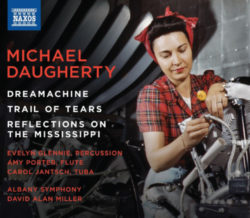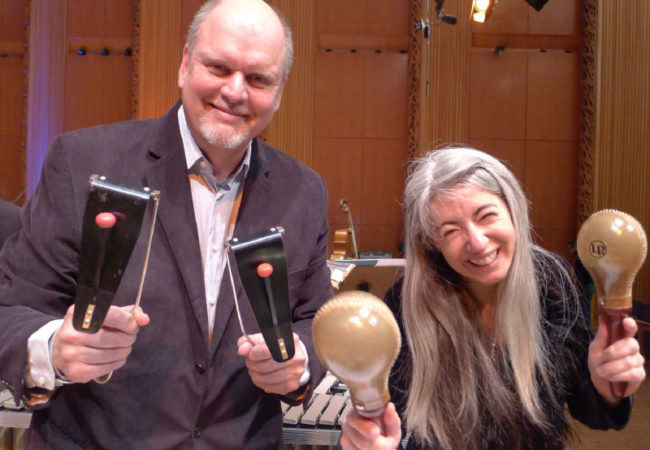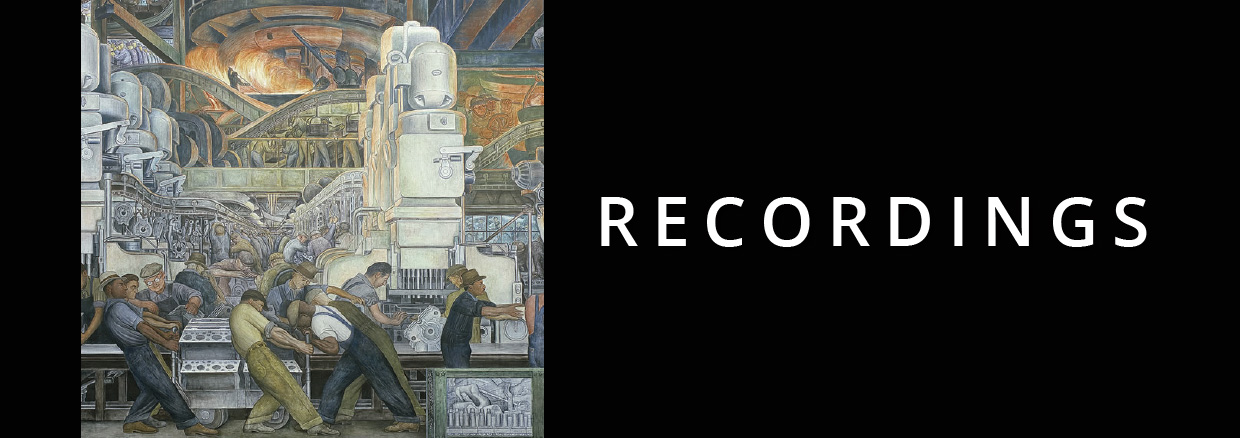Dreamachine/Trail of Tears/Reflections on the Mississippi
NAXOS/March 2018
GRAMMY® Award-winning composer Michael Daugherty explores the relationships between machines, humanity and nature in three unique concertos.

Dreamachine for solo percussion and orchestra is a colorful tribute to the imagination of inventors who dreamed of new machines, both real and surreal. The flute concerto Trail of Tears dramatizes the tragic governmental forced relocation of Native Americans in 1838 and meditates on how the human spirit discovers ways to deal with adversity. Reflections on the Mississippi for tuba and orchestra is a musical voyage down the legendary Mississippi River from Iowa to Louisiana. The Albany Symphony, conducted by David Alan Miller, delivers mesmerizing performances by three outstanding women soloists: GRAMMY® Award-winning percussionist Dame Evelyn Glennie, flutist extraordinaire Amy Porter, and Carol Jantsch, the remarkable principal tuba of The Philadelphia Orchestra.
Trail of Tears
Amy Porter, flute
Albany Symphony Orchestra
David Alan Miller, conductor
I. Where the wind blew free
II. Incantation
III. Sun dance
Dreamachine
Evelyn Glennie, percussion
Albany Symphony Orchestra
David Alan Miller, conductor
I. Da Vinci’s Wings
II. Rube Goldberg’s Variations
III. Electric Eel
IV. Vulcan’s Forge
Reflections on the Mississippi
Carol Jantsch, tuba
Albany Symphony Orchestra
David Alan Miller, conductor
I. Mist
II. Fury
III. Prayer
IV. Steamboat
REVIEW FROM GRAMOPHONE, September 2018
Michael Daugherty has 20 concertos to his name and this highly enjoyable Naxos disc draws together three of his most recent. The centrepiece here is Evelyn Glennie’s scintillating performance of Dreamachine (2014), his third percussion concerto following UFO (1999) and – for timpani- Raise the Roof (2003)…The Albany Symphony accompany here, as throughout, superbly.
REVIEW FROM THE WHOLENOTE MAGAZINE, Summer 2018
Michael Daugherty stands out as being fascinating, compelling and yet profoundly revolutionary in his ability to use the timbral palette of orchestral instruments, squeezing haunting and intuitive, drone-like modalities to evoke feelings of sadness and joy, nostalgia and anticipation, on a grand and sweeping scale.
REVIEW FROM GAPPLEGATE CLASSICAL-MODERN MUSIC, April 2018
This is important music excellently performed. I would not hesitate to point it out as highly representative of Daugherty at his best, and so essential listening for anyone who wants to swim with the current of some of the excellence of what is happening now. Highly recommended!
REVIEW FROM CINEMUSICAL, April 2018
Each of these concerti works quite well on their own but taken together provide an interesting overview of Daugherty’s style. The flute and tuba concerti are the greater finds here. The soloists excellently explore these new works convincingly and the Albany orchestra is in top form as well. …Highly-recommended!
REVIEW FROM MUSICWEB INTERNATIONAL, April 2018
What we have here are three spanking new concertos, for flute, solo percussion and tuba respectively…Daugherty at his inimitable and engaging best; don’t hesitate.
REVIEW FROM ALLMUSIC, March 2018
The music of Michigan-based composer Michael Daugherty has been gaining attention beyond the U.S., and this release in the Naxos label’s American Classics series has accelerated the process…With fine engineering from a pair of spaces in the Troy, New York area backing capable performances from the Albany Symphony under David Alan Miller, this is an unusually strong Daugherty release.
REVIEW FROM INFODAD.COM, March 2018
Listeners will have no doubt at any point that these are concertos, since the soloists are placed quite prominently. Aside from that, the orchestral accompaniment by David Alan Miller and the Albany Symphony is fine… The main effect of Daugherty’s music here, however, comes from the stories it illuminates—something that it does through the composer’s careful selection of solo instruments as well as his ability to find new ways to explore what is essentially traditional tonality. Reflections on the Mississippi(2014), for tuba (Carol Jantsch) and orchestra, is especially successful. Its four movements, portraying scenes the composer says he remembers from youthful times spent by the great river, have sounds that genuinely go with their titles: “Mist,” “Fury,” “Prayer” and “Steamboat.” It is thanks to Jantsch’s marvelous playing that the scenes come so vividly alive…
REVIEW FROM DAVID’S REVIEW CORNER, March 2018
Michael Daugherty is one of North America’s composers who is taking music in a new and audience-pleasing direction using a modern version of traditional tonality. Here we have three ‘concertos’ written in this century for flute, solo percussion and tuba, and, according to the composer, “explores the relationships between machines, humanity, and nature”. Opening with Trail of Tears for flute and chamber orchestra, its three movements relate the sadness that followed the relocation of North American Indians in the 1830’s. It was dreadful blot on the history of the United States that saw thousands of men, women and children die on this the long trek. The first two movements explore the sad qualities the flute can portray, the whirlwind finale a massive technical challenge that will tax any soloist. That it is for a chamber orchestra does not diminish the impact of the accompaniment or its creation of the many variegated colours. The four movement Dreamachine has the percussionist as soloist, and is meant to represent the advances humans have made in machinery, Daugherty trying to encapsulate the machine in music. The nature of invention may not be that obvious, but it does offer the soloist a score of virtuosity with different groups of instruments in each movement. I particularly enjoy the third movement Electric Eel, the slithery creature occupying our attention, though it is the development of electricity that is the invention. The soloist is the famous British percussionist, Evelyn Glennie, who is offered a long virtuoso snare-drum cadenza—probably improvised—in the finale. The great joy of the disc is Reflections on the Mississippi, four pictures of the river from Daugherty’s memories of holidays in his youth by the river. It is made doubly enjoyable by the Philadelphia Orchestra’s young tuba player, Carol Jantsch. From the creamy smooth to the ripe lower notes, she has everything. The Albany Symphony, with their conductor, David Alan Miller, are the admirable supporting group throughout. Soloists are set rather forward, but in excellent overall sound. Highly recommended.

